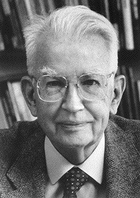| Profile | Major Works | Resources |
Ronald H. Coase, 1910-2013


LSE-trained member of the Chicago School, and father of the New Institutional school.
Ronald H. Coase is best known for two particular contributions to economic theory - his theory of the firm (1937), and his theory of social cost (1960).
Coase 1937 article addressed the problem of why firms exist. Conventional Neoclassical production theory conceives of a firm as little more than an technical instrument connecting factor inputs to output of goods. If so, Coase asked, then why is not production organized in a decentralized manner, e.g. capitalists hiring daily labor, depending on what needs to be produced? Instead, we have a firm, a permanent organized entity, managed internally by command rather than contract. Coase argued that firms should be conceived as entities endogenous to the economic system and whose existence is justified only in the presence of transactions costs to production. Firms, and other economic organizations and institutions, exist because agents find it a useful manner of minimizing transactions costs.
His second major contribution was his famous "Coase Theorem" (1960) on social costs. Previously, it had been longstanding, since Pigou (1912), that externalities could produce a "market failure", and only an entity like a government, by means of taxes and subsidies, could "internalize" externalities in economic exchange or production. But Coase argued that, when one considers opportunity cost in its full meaning, no such devices are necessary: private losers and winners in such cases can "internalize" these externalities themselves through private negotiation between themselves. Moreover, Coase noted, the result will be identical regardless of which party has rights of ownership over the cause of the externality. In short, the manner in which a property right is initially assigned will not affect the efficiency of resource allocation. As a result there shouldn't be market failures. Coase argues the only reason we observe market failures is when property rights are ill-defined or there are transactions costs to negotiation, in which case social costs fail to be internalized. The Coase Theorem opens the range of corrective possibilities beyond Pigouvian taxes for social welfare policy, but policies that clarify or assign property right or reduce transaction costs could be pursued instead.
These two theorems have found wide application throughout economics - and also law, sociology and political science (particularly of the Chicago variety) and launching the whole field of "New Institutional Economics" - thereby making Ronald Coase one of the leading "imperialists" on behalf of economics into other disciplines. It was on the strength of these theorems that R.H. Coase won the Nobel prize in 1991.
|
Major works of Ronald H. Coase
|
|
HET
|
|
Resources on Ronald Coase
|
All rights reserved, Gonšalo L. Fonseca
